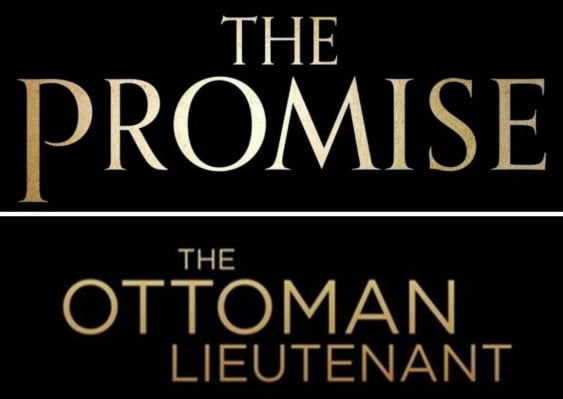There are clear indications that The Ottoman Lieutenant (TOL) movie was made by a Turkish production company to repudiate The Promise (TP), financed by Kirk Kerkorian. My assertions below are based on research available on the internet and IMDB.com. Both films tell a love story that takes place during the Ottoman Empire. However, The Ottoman Lieutenant sets the story under the guise of World War I as a means to justify the atrocities suffered by Armenians as a consequence of war, while The Promise sets the story during the Armenian Genocide committed by the Ottoman Turks during World War I. Asbarez reports.
When a release date of December 2016 was announced for The Promise, the makers of The Ottoman Lieutenant also posted a release date of December 2016 on IMDB.com for consideration of an Oscar nomination – a wishful goal. Since the producers of The Promise announced release of the picture on April 21, 2017, the producers of TOL changed their release date to March 10, 2017 on IMDB.com. It is clear that the producers of The Ottoman Lieutenant are trying to confuse American audiences with their story by releasing their film before The Promise. Furthermore, they want to monetize not only from an American audience but also from the Armenian diaspora.
There is an even more interesting observation to be made with both movie posters: Even though the fonts of each movie title are slightly different, both are capitalized in a yellowish-gold hue against a black background. It is clear the producers of The Ottoman Lieutenant are trying to confuse American audiences by making a poster that resembles the poster of The Promise.
It is also surprisingly “coincidental” how The Ottoman Lieutenant uses the love genre like The Promise to captivate a larger audience base. In The Promise, the love interest of an Armenian woman is a love triangle between an American journalist, Ana, and an Armenian medical student, while in The Ottoman Lieutenant, the love interest of an American woman is with the perceived enemy, a lieutenant in the Ottoman Army. It seems that The Ottoman Lieutenant is trying to seduce American audiences with a fictional story about love between an American and an Ottoman Turk.
Read also
Strangely enough, the story line of The Ottoman Lieutenant on IMDB ends with this sentence, “Now, with invading army forces at their doorstep, and the world about to plunge into all-out war, she must make a decision if she wants to be what other people want her to be, or to be herself.” One can interpret a clear message in the last sentence that suggests Americans should make their own decisions about whether to believe or deny the historical events that took place during a time of war, when the Ottoman Turks committed the Armenian Genocide.
Even more creepy is the website of the production company, Eastern Sunrise Films (www.easternsunrisefilms.com), a Turkish owned production company which made The Ottoman Lieutenant in partnership with Y Production. First of all, there is a spelling mistake in their second heading. They say they write about stories that come from history and how they watch them: “We are close followers of all of them.” This production company was clearly established to make propaganda films to enforce the denial of the Armenian Genocide. If you follow their contact link, they claim they have offices in Newport Beach and Istanbul. Further investigation of the company revealed that it was incorporated in California on October 26, 2015.
It seems that the Turkish government’s propaganda of denying the Armenian Genocide reaches far beyond its borders and into the realms of cinema. Armenians should be more strategic with presenting subjects based on the historical facts of the Armenian Genocide to a global audience. Even though the producers of the The Promise made great effort not to disclose the making of the movie, it seems the Turkish government was right on their coattail for the ride. There is even a posting on the movie’s Facebook page that claims “‘The Ottoman Lieutenant’ is an upcoming American motion picture that brings together two of Turkey’s most legendary actors, Haluk Bilginer and Selçuk Yöntem.” Another article claims CAA negotiated the domestic distribution deal Paladin.
BÉRJ BERAMIAN




























































